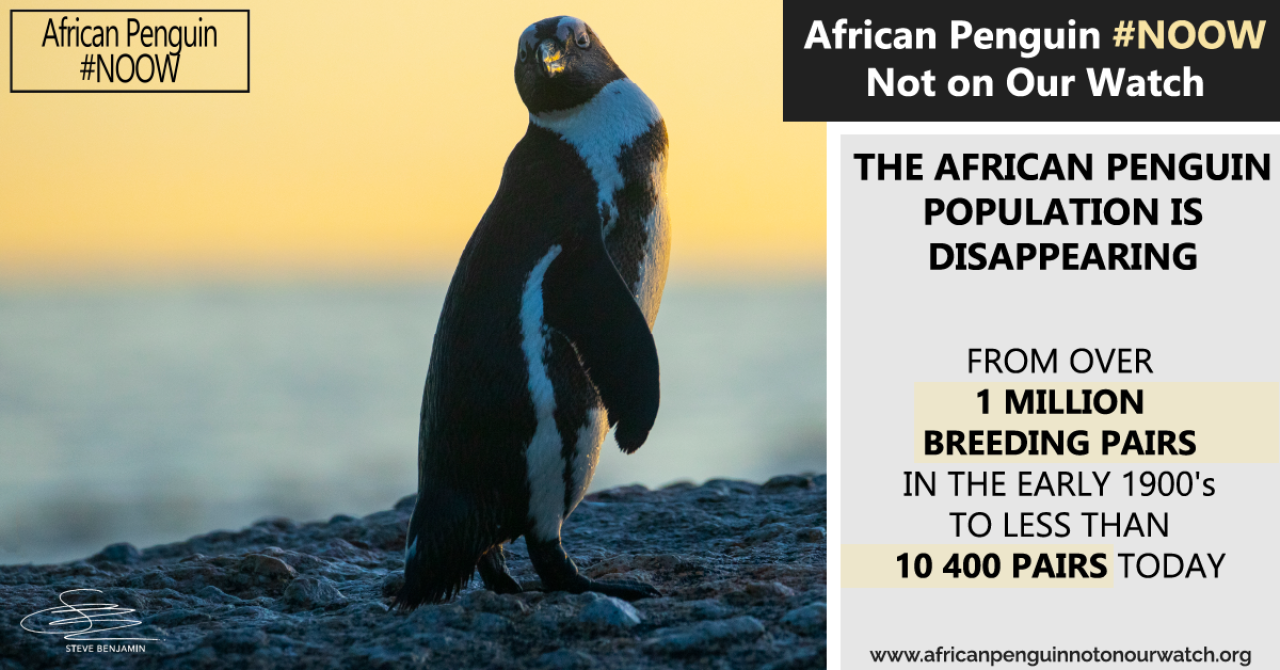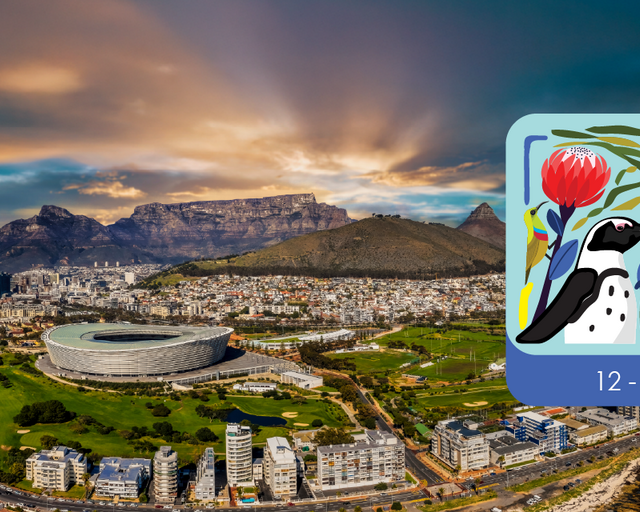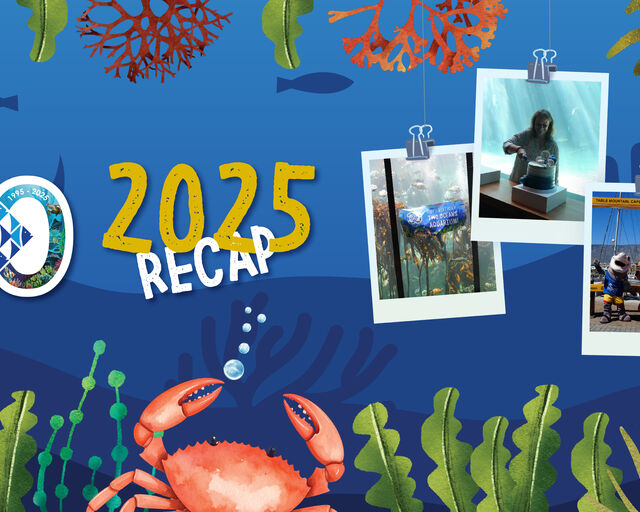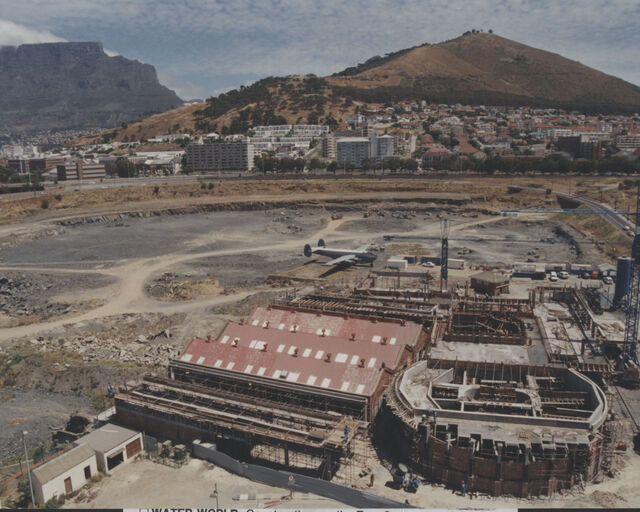#NOOW Not On Our Watch: A campaign to save the African penguin

On 1 March 2023, the #NotOnOurWatch campaign was launched to raise awareness of the urgent plight of the African penguin. The campaign is supported by several conservation organisations including WWF-SA, Endangered Wildlife Trust, SAAMBR, SANCCOB, Birdlife South Africa, African Penguin and Seabird Sanctuary, Dyer Island Conservation Trust, Animal Ocean, and Nelson Mandela University. Funding for the campaign was received from the Two Oceans Aquarium Foundation, the Florida Aquarium and the Georgia Aquarium in the US, and Zoos Victoria in Australia.
“Our goal is to create a movement and raise awareness about the need for urgent action to reverse the decline of the African penguin population in the wild. Through this campaign, we will call for support to ensure that wise decisions concerning the future of the African penguin are made by the relevant authorities. We will create a movement to build pride in African penguins as a part of South Africa’s unique biodiversity and we will assist penguin colony managers by ensuring that visitors to the colonies behave in ways that support penguin wellbeing” said Dr Judy Mann, Head of Strategic Projects at the Two Oceans Aquarium Foundation.
“While many people and organisations are dedicated to the survival of the African penguin and their incredible commitment and hard work must be commended, saving a species needs action on the ground, the support of people and actionable legislation. To date, there has not been a public action campaign for the African penguin. This is where #NOOW comes in” she said.
Why do we need a campaign focusing on African penguins?
At the beginning of the 20th century, it is estimated there were between 1.5 and 3 million individual African penguins across the species’ range along the Namibian and South African coast. It is estimated that there were close to 1 million pairs on the West Coast’s Dassen Island alone. However, by the mid-1950s, only about 300 000 pairs were left due to egg harvesting and guano removal for fertilizer.
Worryingly, since 1979, when the first full count of the major South African colonies was conducted, the current breeding population has declined from ~55 200 pairs to a mere ~10 000 breeding pairs in 2021. To put this in perspective, if every wild breeding penguin in South Africa had a seat in the Ellis Park Stadium in Gauteng, South Africa, the stadium would only be one-third full! With only 4000 breeding pairs in Namibia, these are the lowest numbers ever recorded.
The species has been classified as Endangered on the International Union for Conservation of Nature (IUCN) Red List since 2013. With such a small number of individual birds in the wild and with the current decline, the population will be functionally extinct by 2035. This means that the population will be so small that they will no longer be able to produce enough offspring to increase their numbers again. "The time for action is NOW. If we wait any longer, it will be too late. We need healthy oceans to support marine life now and into the future, especially if we want our children to see African penguins in the wild” stated Dr Mann.
The African penguin
The African penguin (Spheniscus demersus), known for its black and white plumage, black spots on its chest, and the characteristic “bray” resembling the sound of a donkey, is the only species of penguin found on the African continent. It is endemic to the southern African coastline, found from Namibia to the Eastern Cape in South Africa. It is also arguably one of the most accessible penguin species in the world – with mainland African penguin colonies at Boulders Beach and Betty’s Bay as important drawcards for eco-tourism in South Africa. This makes the species a valuable part of South Africa’s natural heritage.
So, what is the problem?
African penguins are faced with multiple pressures that are cumulatively contributing to their decline. Historically, egg harvesting and guano collection led to their decline. However, the more recent decline has been attributed to food shortages caused by shifts in the distributions of their prey species; namely declining small pelagic fish stocks (such as anchovies and sardines) and direct competition with a commercial purse-seine fishery for food. Attempts to mitigate these pressures, such as the Island Closure Experiment, which 10 years ago revealed the value of closing some areas to fishing that were in close proximity to breeding colonies of African penguins, have been undertaken. Despite many years of negotiation, no long-term decisions have been implemented to successfully curb this impact on the African penguin’s decline.
Many African penguin colonies occur in areas that are near existing or planned major shipping routes or ports. A growing threat is the expansion of harbours and increased ship traffic. Another emerging threat for the African penguin is ship-to-ship bunkering, which has started in Algoa Bay and is planned to expand to the West Coast. A large oil spill, such as the four in Algoa Bay since 2016, in the proximity of a breeding colony, could destroy much of the remaining population.
In some areas, marine noise pollution is another emerging threat to African penguins, with evidence suggesting the scale of this impact could be large. The maritime industry, including exploration for oil and gas reserves using seismic surveys, is a further looming threat.
Harvesting guano removed the nest material used by the penguin in the past. Although guano harvesting is no longer allowed, a lack of nesting habitat is a concern. This is being addressed through revegetation efforts at some colonies and the deployment of artificial nests is currently being tested at several colonies.
Other threats include disease outbreaks, extreme weather events, localised predation, and human disturbance at breeding colonies. All these threats require carefully implemented management plans for each penguin colony.
It’s not just about the African Penguin
This beloved bird, together with other penguin species, holds an important role in ensuring a balanced and healthy marine environment. They are sentinels of ecosystem health and play an important role in the functioning of marine ecosystems. African penguin colonies provide an indication of the status of other marine top predators that target the same prey (sardines and anchovies) and are thus important indicators of the status of pelagic marine ecosystems.
The possible extinction of African penguins will not only lead to the loss of a charismatic species but will also have far-reaching environmental and economic impacts such as job losses for tourism and conservation. Areas like Boulders Beach in Simon’s Town and Stony Point in Betty’s Bay on the Cape coast will lose this iconic species that attract many people to these areas, and Africa will lose the only endemic penguin species on the continent.
How to support the campaign
- Visit the website www.africanpenguinnotonourwatch.org
- Follow on Facebook and Instagram and share the #NOOW campaign posts.
- Share your love for penguins by sharing your photos and videos on social media using the hashtags #AfricanPenguin #NOOW.
- Mobilise a #NotOnOurWatch Penguin Waddle Event at your organisation to celebrate World Penguin Day on 23 April 2023.
Please contact Dr Judy Mann by email judy@aquariumfoundation.org.za if you would like to be involved in the #NOOW campaign.
Related News
Sign up to our Newsletter
Receive monthly news, online courses and conservation programmes.



